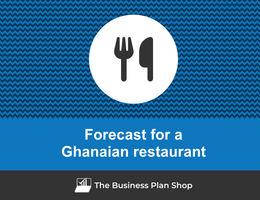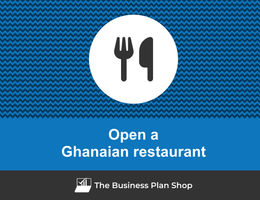How to write a business plan for a Ghanaian restaurant?
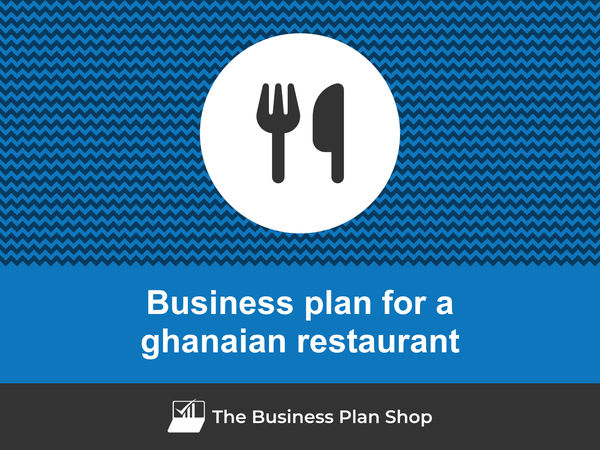
Creating a business plan for a Ghanaian restaurant is an essential process for any entrepreneur. It serves as a roadmap that outlines the necessary steps to be taken to start or grow the business, the resources required, and the anticipated financial outcomes. It should be crafted with method and confidence.
This guide is designed to provide you with the tools and knowledge necessary for creating a Ghanaian restaurant business plan, covering why it is so important both when starting up and running an established business, what should be included in your plan, how it should be structured, what tools should be used to save time and avoid errors, and other helpful tips.
We have a lot to cover, so let's get to it!
Why write a business plan for a Ghanaian restaurant?
Understanding the document's scope and goals will help you easily grasp its structure and content. Before diving into the specifics of the plan, let's take a moment to explore the key reasons why having a Ghanaian restaurant business plan is so crucial.
To have a clear roadmap to grow the business
It's rarely business as usual for small businesses. The economy follows cycles where years of growth are followed by recessions, and the business environment is always changing with new technologies, new regulations, new competitors, and new consumer behaviours appearing all the time...
In this context, running a business without a clear roadmap is like driving blindfolded: it's dangerous at best. That's why writing a business plan for a Ghanaian restaurant is essential to create successful and sustainable businesses.
To write an effective business plan, you will need to take stock of where you are (if you are already in business) and where you want the business to go in the next three to five years.
Once you know where you want your Ghanaian restaurant to be, you'll have to identify:
- what resources (human, equipment, and capital) are needed to get there,
- at what pace the business needs to progress to get there in time,
- and what risks you'll face along the way.
Going through this process regularly is beneficial, both for startups and existing companies, as it helps make informed decisions about how best to allocate resources to ensure the long-term success of the business.
To get visibility on future cash flows
If your small Ghanaian restaurant runs out of cash: it's game over. That's why we often say "cash is king", and it's crucial to have a clear view of your Ghanaian restaurant's future cash flows.
So, how can you achieve this? It's simple - you need to have an up-to-date financial forecast.
The good news is that your Ghanaian restaurant business plan already includes a financial forecast (which we'll discuss further in this guide). Your task is to ensure it stays current.
To accomplish this, it's essential to regularly compare your actual financial performance with what was planned in your financial forecast. Based on your business's current trajectory, you can make adjustments to the forecast.
By diligently monitoring your Ghanaian restaurant's financial health, you'll be able to spot potential financial issues, like unexpected cash shortfalls, early on and take corrective actions. Moreover, this practice will enable you to recognize and capitalize on growth opportunities, such as excess cash flow enabling you to expand to new locations.
To secure financing
A detailed business plan becomes a crucial tool when seeking financing from banks or investors for your Ghanaian restaurant.
Investing and lending to small businesses are very risky activities given how fragile they are. Therefore, financiers have to take extra precautions before putting their capital at risk.
At a minimum, financiers will want to ensure that you have a clear roadmap and a solid understanding of your future cash flows (like we just explained above). But they will also want to ensure that your business plan fits the risk/reward profile they seek.
This will off-course vary from bank to bank and investor to investor, but as a rule of thumb. Banks will want to see a conservative financial management style (low risk), and they will use the information in your business plan to assess your borrowing capacity — the level of debt they think your business can comfortably handle — and your ability to repay the loan. This evaluation will determine whether they'll provide credit to your Ghanaian restaurant and the terms of the agreement.
Whereas investors will carefully analyze your business plan to gauge the potential return on their investment. Their focus lies on evidence indicating your Ghanaian restaurant's potential for high growth, profitability, and consistent cash flow generation over time.
Now that you recognize the importance of creating a business plan for your Ghanaian restaurant, let's explore what information is required to create a compelling plan.
Need a convincing business plan?
The Business Plan Shop makes it easy to create a financial forecast to assess the potential profitability of your projects, and write a business plan that’ll wow investors.

Information needed to create a business plan for a Ghanaian restaurant
Drafting a Ghanaian restaurant business plan requires research so that you can project sales, investments and cost accurately in your financial forecast, and convince the reader that there is a viable commercial opportunity to be seized.
Below, we'll focus on three critical pieces of information you should gather before starting to write your plan.
Carrying out market research for a Ghanaian restaurant
Before you begin writing your business plan for a Ghanaian restaurant, conducting market research is a critical step in ensuring precise and realistic financial projections.
Market research grants you valuable insights into your target customer base, competitors, pricing strategies, and other crucial factors that can impact the success of your business.
In the course of this research, you may stumble upon trends that could impact your Ghanaian restaurant.
You may discover that your local customer base may have an interest in trying new dishes from other parts of Ghana, or other West African countries. Additionally, your research could reveal that customers may be looking for more sustainable and locally sourced ingredients in your recipes.
Such market trends play a pivotal role in revenue forecasting, as they provide essential data regarding potential customers' spending habits and preferences.
By integrating these findings into your financial projections, you can provide investors with more accurate information, enabling them to make well-informed decisions about investing in your Ghanaian restaurant.
Developing the marketing plan for a Ghanaian restaurant
Before delving into your Ghanaian restaurant business plan, it's imperative to budget for sales and marketing expenses.
To achieve this, a comprehensive sales and marketing plan is essential. This plan should provide an accurate projection of the necessary actions to acquire and retain customers.
Additionally, it will outline the required workforce to carry out these initiatives and the corresponding budget for promotions, advertising, and other marketing endeavours.
By budgeting accordingly, you can ensure that the right resources are allocated to these vital activities, aligning them with the sales and growth objectives outlined in your business plan.
The staffing and equipment needs of a Ghanaian restaurant
As you embark on starting or expanding your Ghanaian restaurant, having a clear plan for recruitment and capital expenditures (investment in equipment and real estate) is essential for ensuring your business's success.
Both the recruitment and investment plans must align with the timing and level of growth projected in your forecast, and they require appropriate funding.
A Ghanaian restaurant might incur staffing costs such as wages for skilled chefs, dishwashers, waiters and waitresses, and cleaners. The restaurant might also need to purchase equipment such as cooking appliances, refrigerators, dishwashers, cutlery and crockery, tables and chairs, and other kitchen items.
To create a realistic financial forecast, you also need to consider other operating expenses associated with the day-to-day running of your business, such as insurance and bookkeeping.
With all the necessary information at hand, you are ready to begin crafting your business plan and developing your financial forecast.
What goes into your Ghanaian restaurant's financial forecast?
The objective of the financial forecast of your Ghanaian restaurant's business plan is to show the growth, profitability, funding requirements, and cash generation potential of your business over the next 3 to 5 years.
The four key outputs of a financial forecast for a Ghanaian restaurant are:
- The profit and loss (P&L) statement,
- The projected balance sheet,
- The cash flow forecast,
- And the sources and uses table.
Let's look at each of these in a bit more detail.
The projected P&L statement
The projected P&L statement for a Ghanaian restaurant shows how much revenue and profits your business is expected to generate in the future.
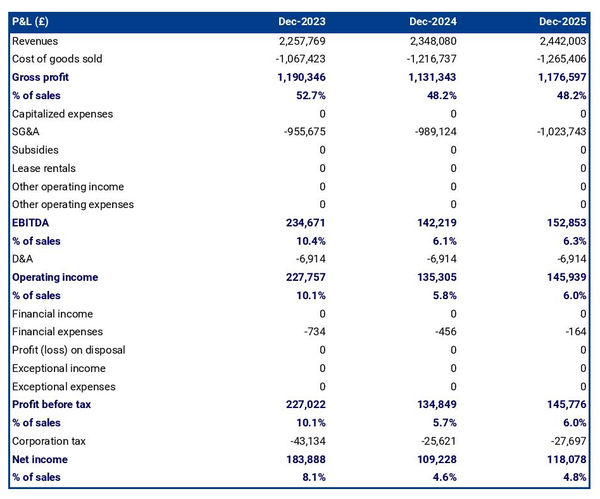
Ideally, your Ghanaian restaurant's P&L statement should show:
- Healthy growth - above inflation level
- Improving or stable profit margins
- Positive net profit
Expectations will vary based on the stage of your business. A startup will be expected to grow faster than an established Ghanaian restaurant. And similarly, an established company should showcase a higher level of profitability than a new venture.
The projected balance sheet of your Ghanaian restaurant
Your Ghanaian restaurant's forecasted balance sheet enables the reader of your plan to assess your financial structure, working capital, and investment policy.
It is composed of three types of elements: assets, liabilities and equity:
- Assets: represent what the business owns and uses to produce cash flows. It includes resources such as cash, equipment, and accounts receivable (money owed by clients).
- Liabilities: represent funds advanced to the business by lenders and other creditors. It includes items such as accounts payable (money owed to suppliers), taxes due and loans.
- Equity: is the combination of what has been invested by the business owners and the cumulative profits and losses generated by the business to date (which are called retained earnings). Equity is a proxy for the value of the owner's stake in the business.
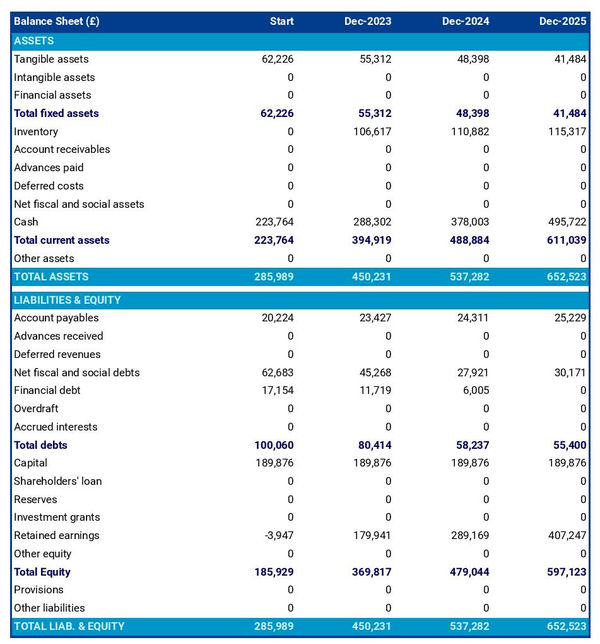
Your Ghanaian restaurant's balance sheet will usually be analyzed in conjunction with the other financial statements included in your forecast.
Two key points of focus will be:
- Your Ghanaian restaurant's liquidity: does your business have sufficient cash and short-term assets to pay what it owes over the next 12 months?
- And its solvency: does your business have the capacity to repay its debt over the medium-term?
The cash flow forecast
As we've seen earlier in this guide, monitoring future cash flows is the key to success and the only way of ensuring that your Ghanaian restaurant has enough cash to operate.
As you can expect showing future cash flows is the main role of the cash flow forecast in your Ghanaian restaurant business plan.
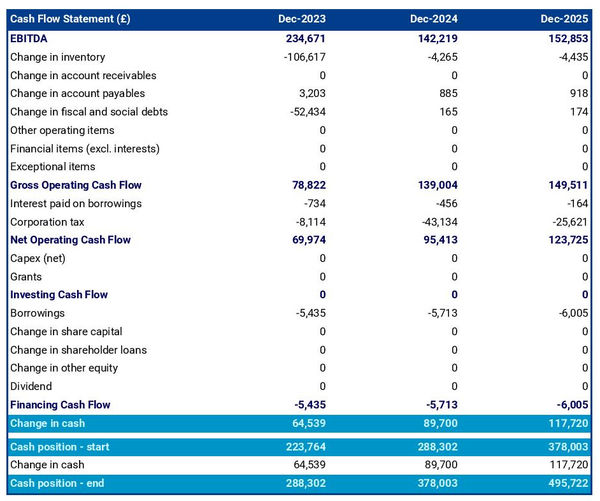
It is best practice to organise the cash flow statement by nature in order to show the cash impact of the following areas:
- Cash flow generated from operations: the operating cash flow shows how much cash is generated or consumed by the business's commercial activities
- Cash flow from investing activities: the investing cash flow shows how much cash is being invested in capital expenditure (equipment, real estate, etc.) either to maintain the business's equipment or to expand its capabilities
- Cash flow from financing activities: the financing cash flow shows how much cash is raised or distributed to financiers
Looking at the cash flow forecast helps you to make sure that your business has enough cash to keep running, and can help you anticipate potential cash shortfalls.
Your Ghanaian restaurant business plan will normally include both yearly and monthly cash flow forecasts so that the readers can view the impact of seasonality on your business cash position and generation.
The initial financing plan
The initial financing plan, also known as a sources and uses table, is a valuable resource to have in your business plan when starting your Ghanaian restaurant as it reveals the origins of the money needed to establish the business (sources) and how it will be allocated (uses).

Having this table helps show what costs are involved in setting up your Ghanaian restaurant, how risks are shared between founders, investors and lenders, and what the starting cash position will be. This cash position needs to be sufficient to sustain operations until the business reaches a break-even point.
Now that you have a clear understanding of what goes into the financial forecast of your Ghanaian restaurant business plan, let's shift our focus to the written part of the plan.
Need a convincing business plan?
The Business Plan Shop makes it easy to create a financial forecast to assess the potential profitability of your projects, and write a business plan that’ll wow investors.

The written part of a Ghanaian restaurant business plan
The written part of the business plan is where you will explain what your business does and how it operates, what your target market is, whom you compete against, and what strategy you will put in place to seize the commercial opportunity you've identified.
Having this context is key for the reader to form a view on whether or not they believe that your plan is achievable and the numbers in your forecast realistic.
The written part of a Ghanaian restaurant business plan is composed of 7 main sections:
- The executive summary
- The presentation of the company
- The products and services
- The market analysis
- The strategy
- The operations
- The financial plan
Let's go through the content of each section in more detail!
1. The executive summary
The first section of your Ghanaian restaurant's business plan is the executive summary which provides, as its name suggests, an enticing summary of your plan which should hook the reader and make them want to know more about your business.
When writing the executive summary, it is important to provide an overview of the business, the market, the key financials, and what you are asking from the reader.
Start with a brief introduction of the business, its name, concept, location, how long it has been in operation, and what makes it unique. Mention any services or products you plan to offer and who you sell to.
Then you should follow with an overview of the addressable market for your Ghanaian restaurant, current trends, and potential growth opportunities.
You should then include a summary of your key financial figures such as projected revenues, profits, and cash flows.
Finally, you should detail any funding requirements in the ask section.
2. The presentation of the company
In your Ghanaian restaurant business plan, the second section should focus on the structure and ownership, location, and management team of your company.
In the structure and ownership part, you'll provide an overview of the business's legal structure, details about the owners, and their respective investments and ownership shares. This clarity is crucial, especially if you're seeking financing, as it helps the reader understand which legal entity will receive the funds and who controls the business.
Moving on to the location part, you'll offer an overview of the company's premises and their surroundings. Explain why this particular location is of interest, highlighting factors like catchment area, accessibility, and nearby amenities.
When describing the location of your Ghanaian restaurant, you could emphasize the potential for increasing foot traffic in the area. You could explain how the area may have a large population of people who are interested in trying out Ghanaian cuisine, or that it could be a popular destination for people looking to explore a variety of cuisines. Additionally, you could highlight the advantages of being close to public transportation and other attractions that could draw in customers.
Finally, you should introduce your management team. Describe each member's role, background, and experience.
Don't forget to emphasize any past successes achieved by the management team and how long they've been working together. Demonstrating their track record and teamwork will help potential lenders or investors gain confidence in their leadership and ability to execute the business plan.
3. The products and services section
The products and services section of your business plan should include a detailed description of the offerings that your company provides to its customers.
For example, your Ghanaian restaurant might offer traditional Ghanaian dishes such as jollof rice, fufu, and red-red to customers. These dishes are popular in Ghana and can be served with a variety of accompaniments such as plantains, peanuts, and fish. You could also offer traditional Ghanaian drinks such as palm wine and mahewu to customers. These drinks, made of natural ingredients, are unique and refreshing. Finally, you could offer a selection of pastries and desserts such as puff-puff, coconut cookies, and waakye for those with a sweet tooth. These dishes and drinks will bring the Ghanaian experience to customers.
When drafting this section, you should be precise about the categories of products or services you sell, the types of customers you are targeting and how customers can buy them.
4. The market analysis
When presenting your market analysis in your Ghanaian restaurant business plan, you should detail the customers' demographics and segmentation, target market, competition, barriers to entry, and any regulations that may apply.
The goal of this section is to help the reader understand how big and attractive your market is, and demonstrate that you have a solid understanding of the industry.
You should start with the demographics and segmentation subsection, which gives an overview of the addressable market for your Ghanaian restaurant, the main trends in the marketplace, and introduces the different customer segments and their preferences in terms of purchasing habits and budgets.
The target market section should follow and zoom on the customer segments your Ghanaian restaurant is targeting, and explain how your products and services meet the specific needs of these customers.
For example, your target market might include young professionals living in the city. They likely have a higher disposable income and enjoy trying new cuisine. They are likely to appreciate the authenticity of a traditional Ghanaian restaurant and the unique flavors of the cuisine.
Then comes the competition subsection, where you should introduce your main competitors and explain what differentiates you from them.
Finally, you should finish your market analysis by giving an overview of the main regulations applicable to your Ghanaian restaurant.
5. The strategy section
When you write the strategy section of your Ghanaian restaurant business plan, remember to cover key elements such as your competitive edge, pricing strategy, sales & marketing plan, milestones, and risks and mitigants.
In the competitive edge subsection, elaborate on what makes your company stand out from competitors. This becomes especially important if you're a startup, aiming to carve a place for yourself amidst established players in the marketplace.
The pricing strategy subsection should demonstrate how you plan to maintain profitability while offering competitive prices to attract customers.
Outline your sales & marketing plan, detailing how you'll reach out to new customers and retain existing ones through loyalty programs or special offers.
For the milestones subsection, outline your company's achievements to date and your main objectives for the future, complete with specific dates to set clear expectations for progress.
Lastly, the risks and mitigants subsection should address the main risks that could affect your plan's execution. Explain the measures you've put in place to minimize these risks, assuring potential investors or lenders.
Your Ghanaian restaurant faces a variety of risks. For example, you may face the risk of theft or vandalism. If your restaurant is located in a high-crime area, there is a risk that property or food could be stolen or vandalized. Additionally, you could face the risk of food contamination or spoilage. If food is not prepared or stored properly, it could lead to food-borne illnesses or cause food to spoil and become inedible. These are just a few of the many risks your Ghanaian restaurant may face.
6. The operations section
The operations of your Ghanaian restaurant must be presented in detail in your business plan.
Begin by addressing your staff, specifying the main roles and your recruitment plan to support the anticipated growth. Outline the qualifications and experience needed for each role and discuss your recruitment strategies, which may involve using job boards, referrals, or headhunters.
Next, clearly state your Ghanaian restaurant's operating hours, allowing the reader to gauge the adequacy of your staffing levels. Additionally, mention any considerations for varying opening times during peak seasons and your approach to handling customer queries outside regular operating hours.
The key assets and intellectual property (IP) required to run your business should also be highlighted. If you rely on licenses, trademarks, physical structures like equipment or property, or lease agreements, ensure they are well-documented in this section.
You may have key assets such as the recipes and ingredients used in your dishes, as well as the physical location of the restaurant. Your recipes and the ingredients used could be considered Intellectual Property (IP) that you could protect and utilize to your advantage. Additionally, the physical location of your restaurant might be another key asset that you could leverage to draw in customers. All of these assets could help make your Ghanaian restaurant a success.
Finally, provide a comprehensive list of suppliers you intend to collaborate with, along with a breakdown of their services and main commercial terms, such as price, payment terms, break clauses and contract duration. Investors often seek insight into the reasons behind your supplier choices, which may include a preference for higher-quality products or established relationships from past ventures.
7. The presentation of the financial plan
The financial plan section is where we will include the financial forecast we talked about earlier in this guide.
Now that you have a clear idea of the content of a Ghanaian restaurant business plan, let's look at some of the tools you can use to create yours.
What tool should I use to write my Ghanaian restaurant's business plan?
There are two main ways of creating your Ghanaian restaurant business plan:
- Using specialized business planning software,
- Hiring a business plan writer.
Using an online business plan software for your Ghanaian restaurant's business plan
Using online business planning software is the most efficient and modern way to create a Ghanaian restaurant business plan.
There are several advantages to using specialized software:
- You can easily create your financial forecast by letting the software take care of the financial calculations for you without errors
- You are guided through the writing process by detailed instructions and examples for each part of the plan
- You can access a library of dozens of complete business plan samples and templates for inspiration
- You get a professional business plan, formatted and ready to be sent to your bank or investors
- You can easily track your actual financial performance against your financial forecast
- You can create scenarios to stress test your forecast's main assumptions
- You can easily update your forecast as time goes by to maintain visibility on future cash flows
- You have a friendly support team on standby to assist you when you are stuck
If you're interested in using this type of solution, you can try The Business Plan Shop for free by signing up here.
Need a convincing business plan?
The Business Plan Shop makes it easy to create a financial forecast to assess the potential profitability of your projects, and write a business plan that’ll wow investors.

Hiring a business plan writer to write your Ghanaian restaurant's business plan
Outsourcing your Ghanaian restaurant business plan to a business plan writer can also be a viable option.
Business plan writers are experienced in writing business plans and adept at creating financial forecasts without errors. Furthermore, hiring a consultant can save you time and allow you to focus on the day-to-day operations of your business.
However, hiring business plan writers is expensive as you are paying for the software used by the consultant, plus their time, and their profit margin of course.
From experience, you need to budget at least £1.5k ($2.0k) excluding tax for a complete business plan, more if you need to make changes after the initial version (which happens frequently after the initial meetings with lenders or investors).
You also need to be careful when seeking investment. Investors want their money to be used to grow the business, not spent on consulting fees. Therefore, the amount you spend on business plan writing services (and other consulting services such as legal services) needs to be negligible relative to the amount raised.
The other drawback is that you usually don't own the business plan itself: you just get the output, while the actual document is saved in the consultant's business plan software - which makes it difficult to maintain the document up to date without hiring the consultant on a retainer.
For these reasons, outsourcing the Ghanaian restaurant business plan to a business plan writer should be considered carefully, weighing both the advantages and disadvantages of hiring outside help.
Ultimately, it may be the right decision for some businesses, while others may find it beneficial to write their business plan using online software.
Why not create your Ghanaian restaurant's business plan using Word or Excel?
I must advise against using Microsoft Excel and Word (or their Google, Apple, or open-source equivalents) to write your Ghanaian restaurant business plan. Let me explain why.
Firstly, creating an accurate and error-free financial forecast on Excel (or any spreadsheet) is highly technical and requires a strong grasp of accounting principles and financial modelling skills. It is, therefore, unlikely that anyone will fully trust your numbers unless you have both a degree in finance and accounting and significant financial modelling experience, like us at The Business Plan Shop.
Secondly, relying on spreadsheets is inefficient. While it may have been the only option in the past, technology has advanced significantly, and software can now perform these tasks much faster and with greater accuracy. With the rise of AI, software can even help us detect mistakes in forecasts and analyze the numbers for better decision-making.
And with the rise of AI, software is also becoming smarter at helping us detect mistakes in our forecasts and helping us analyse the numbers to make better decisions.
Moreover, software makes it easier to compare actuals versus forecasts and maintain up-to-date forecasts to keep visibility on future cash flows, as we discussed earlier in this guide. This task is cumbersome when using spreadsheets.
Now, let's talk about the written part of your Ghanaian restaurant business plan. While it may be less error-prone, using software can bring tremendous gains in productivity. Word processors, for example, lack instructions and examples for each part of your business plan. They also won't automatically update your numbers when changes occur in your forecast, and they don't handle formatting for you.
Overall, while Word or Excel may seem viable for some entrepreneurs to create a business plan, it's by far becoming an antiquated way of doing things.
Takeaways
- Having an up-to-date business plan is key to maintaining visibility on your future cash flows.
- A business plan has 2 parts: a financial forecast highlighting the expected growth, profitability and cash generation of the business; and a written part which provides the context needed to interpret and assess the quality of the forecast.
- Using business plan software is the modern way of writing and maintaining business plans.
We hope that this guide helped you to better understand how to write the business plan for a Ghanaian restaurant. If you still have questions, do not hesitate to contact us.
Also on The Business Plan Shop
- How to write a 5 years business plan
- How to write a 3-year business plan?
- Business plan financial projections template
- Business model canvas vs business plan
- Business plan myths
Know someone who owns or wants to start a Ghanaian restaurant? Share this article with them!


